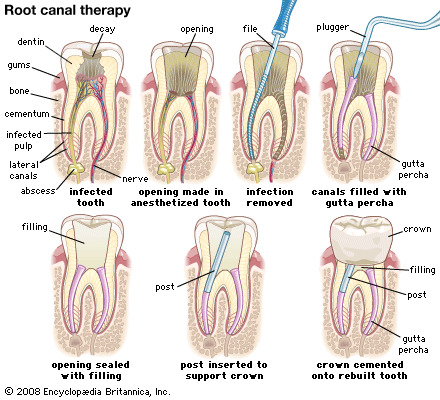Of all dental procedures, a root canal is probably one more dreaded by patients than any other, because practically everyone has heard some nightmare story about them. Remarkably, though, with proper diagnosis and management, the need for root canals can largely be avoided, and in cases where they are needed, they are virtually never painful, either during or after the procedure! There is so much misinformation out there, though, that it seems appropriate to provide some answers to those Frequently Asked Questions about Dental Toothaches & Root Canals:
What is a Root Canal, and Why Might You Need One?
There are several possible reasons you might need a root canal, including:
- A large cavity that reaches the nerve, resulting in pulpal infection
- Part of the tooth breaks due to trauma
- The tooth cracks due to grinding or clenching your teeth
- Tooth resorption
Essentially, what happens during a root canal is that we remove the infected, painful nerve tissue from inside the tooth, clean the area with several disinfecting solutions, which also help remove debris, then seal the inside of the roots with a cement and a special form of rubber called gutta percha. There are several variations on the technique and sealers, but they all do the same basic thing.
Does a Root Canal Hurt?
In the large majority of cases, once the tooth is numbed, the answer is NO, you should NOT experience pain during the procedure. If you do, please signal your dentist that you are still feeling the procedure.
Sometimes, a tooth is so badly infected that your face may swell up. In these cases, the infection is severe enough that it will decrease the numbing’s effectiveness, and you may just need a lot more anesthetic.
Shouldn’t I Get Antibiotics for the Infection?
For most patients, if the infection is not bad enough that your face is swelling or you’re experiencing signs of real illness, such as fever or body aches, antibiotics are NOT appropriate. In fact, the risk of you experiencing an allergic reaction to common antibiotics is greater than the benefit. Why aren’t they the right thing? Because the holes in the tooth roots where the nerve and blood vessels enter the tooth are so small, not enough antibiotics can get into the tooth to make a difference. If a tooth hurts that badly, an alternating regimen of ibuprofen and Tylenol is just as effective for most people as narcotic pain relievers.
What about After the Root Canal – What Does the Tooth Need?
For most teeth in the back of your mouth (premolars and molars), you should get a crown done, or something similar that will hold the tooth together. Because a lot of the inside of the tooth is removed during the procedure, it is much weaker, and a crown will help hold the rest of the tooth together. For most front teeth, however, crowns are usually avoidable unless the tooth is badly decayed or broken. If you do need a crown, please get it done quickly! If you wait too long, the tooth may break beyond repair, which means all the time and money you spent goes to waste.
How Long Does a Root Canal Take to Do?
If you think about it, doing a root canal is much like micro-surgery, because the roots inside the tooth are so small and skinny. A front tooth, with a big open nerve, might only take 40-60 minutes to complete properly. A molar tooth, with long skinny roots and multiple canals, may take several hours. Basically, they are rarely easy and require time to do well. It helps a lot if your dentist or endodontist uses a high level of magnification and intense light to see well; a dental operating microscope is the best way to see well.
If you are in pain and need an emergency dental appointment,
call us at 704-364-7069 or Request an Appointment Online.
As an active member of online professional forums, and through my many years of ongoing Continuing Education, I am fortunate to know many excellent dentists around the United States, and even around the world, to whom I would feel comfortable sending my own family for needed dental work. We share this list of colleagues, so if you are out of town, moving to another city, traveling, whatever…….if you need a dentist for emergency dental treatment or need a new dentist, please see if there is one on this list of my recommended colleagues:







